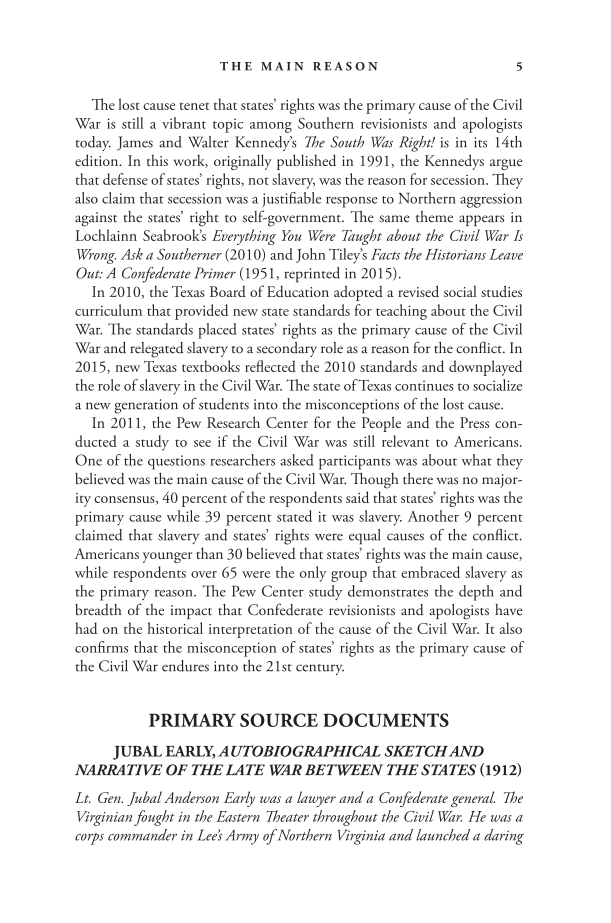T H E M A I N R E A S O N 5 The lost cause tenet that states’ rights was the primary cause of the Civil War is still a vibrant topic among Southern revisionists and apologists today. James and Walter Kennedy’s The South Was Right! is in its 14th edition. In this work, originally published in 1991, the Kennedys argue that defense of states’ rights, not slavery, was the reason for secession. They also claim that secession was a justifiable response to Northern aggression against the states’ right to self-government. The same theme appears in Lochlainn Seabrook’s Everything You Were Taught about the Civil War Is Wrong. Ask a Southerner (2010) and John Tiley’s Facts the Historians Leave Out: A Confederate Primer (1951, reprinted in 2015). In 2010, the Texas Board of Education adopted a revised social studies curriculum that provided new state standards for teaching about the Civil War. The standards placed states’ rights as the primary cause of the Civil War and relegated slavery to a secondary role as a reason for the conflict. In 2015, new Texas textbooks reflected the 2010 standards and downplayed the role of slavery in the Civil War. The state of Texas continues to socialize a new generation of students into the misconceptions of the lost cause. In 2011, the Pew Research Center for the People and the Press con- ducted a study to see if the Civil War was still relevant to Americans. One of the questions researchers asked participants was about what they believed was the main cause of the Civil War. Though there was no major- ity consensus, 40 percent of the respondents said that states’ rights was the primary cause while 39 percent stated it was slavery. Another 9 percent claimed that slavery and states’ rights were equal causes of the conflict. Americans younger than 30 believed that states’ rights was the main cause, while respondents over 65 were the only group that embraced slavery as the primary reason. The Pew Center study demonstrates the depth and breadth of the impact that Confederate revisionists and apologists have had on the historical interpretation of the cause of the Civil War. It also confirms that the misconception of states’ rights as the primary cause of the Civil War endures into the 21st century. PRIMARY SOURCE DOCUMENTS JUBAL EARLY, AUTOBIOGRAPHICAL SKETCH AND NARRATIVE OF THE LATE WAR BETWEEN THE STATES (1912) Lt. Gen. Jubal Anderson Early was a lawyer and a Confederate general. The Virginian fought in the Eastern Theater throughout the Civil War. He was a corps commander in Lee’s Army of Northern Virginia and launched a daring
Document Details My Account Print multiple pages
Print
You have printed 0 times in the last 24 hours.
Your print count will reset on at .
You may print 0 more time(s) before then.
You may print a maximum of 0 pages at a time.






















































































































































































































































